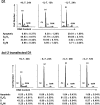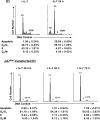IL-7 promotes T cell proliferation through destabilization of p27Kip1
- PMID: 16492801
- PMCID: PMC2118250
- DOI: 10.1084/jem.20051520
IL-7 promotes T cell proliferation through destabilization of p27Kip1
Abstract
Interleukin (IL)-7 is required for survival and homeostatic proliferation of T lymphocytes. The survival effect of IL-7 is primarily through regulation of Bcl-2 family members; however, the proliferative mechanism is unclear. It has not been determined whether the IL-7 receptor actually delivers a proliferative signal or whether, by promoting survival, proliferation results from signals other than the IL-7 receptor. We show that in an IL-7-dependent T cell line, cells protected from apoptosis nevertheless underwent cell cycle arrest after IL-7 withdrawal. This arrest was accompanied by up-regulation of the cyclin-dependent kinase inhibitor p27Kip1 through a posttranslational mechanism. Overexpression of p27Kip1 induced G1 arrest in the presence of IL-7, whereas knockdown of p27Kip1 by small interfering RNA promoted S phase entry after IL-7 withdrawal. CD4 or CD8 T cells transferred into IL-7-deficient hosts underwent G1 arrest, whereas 27Kip1-deficient T cells underwent proliferation. We observed that IL-7 withdrawal activated protein kinase C (PKC)theta and that inhibition of PKCtheta with a pharmacological inhibitor completely blocked the rise of p27Kip1 and rescued cells from G1 arrest. The conventional pathway to breakdown of p27Kip1 is mediated by S phase kinase-associated protein 2; however, our evidence suggests that PKCtheta acts via a distinct, unknown pathway inducing G1 arrest after IL-7 withdrawal from T cells. Hence, IL-7 maintains T cell proliferation through a novel pathway of p27Kip1 regulation.
Figures








References
-
- Schluns, K.S., W.C. Kieper, S.C. Jameson, and L. Lefrancois. 2000. Interleukin-7 mediates the homeostasis of naive and memory CD8 T cells in vivo. Nat. Immunol. 1:426–432. - PubMed
-
- Seddon, B., P. Tomlinson, and R. Zamoyska. 2003. Interleukin 7 and T cell receptor signals regulate homeostasis of CD4 memory cells. Nat. Immunol. 4:680–686. - PubMed
Publication types
MeSH terms
Substances
Grants and funding
LinkOut - more resources
Full Text Sources
Molecular Biology Databases
Research Materials

